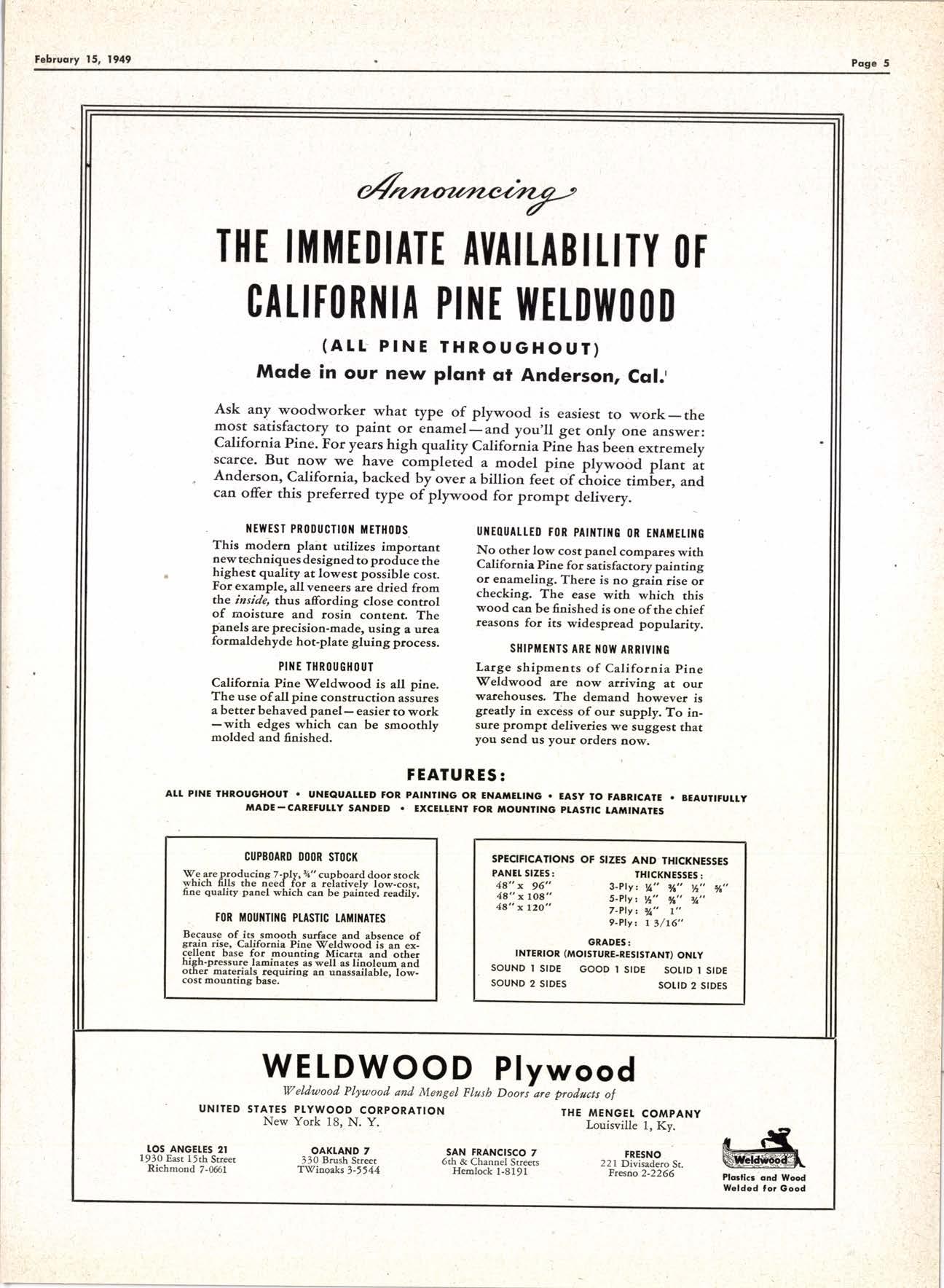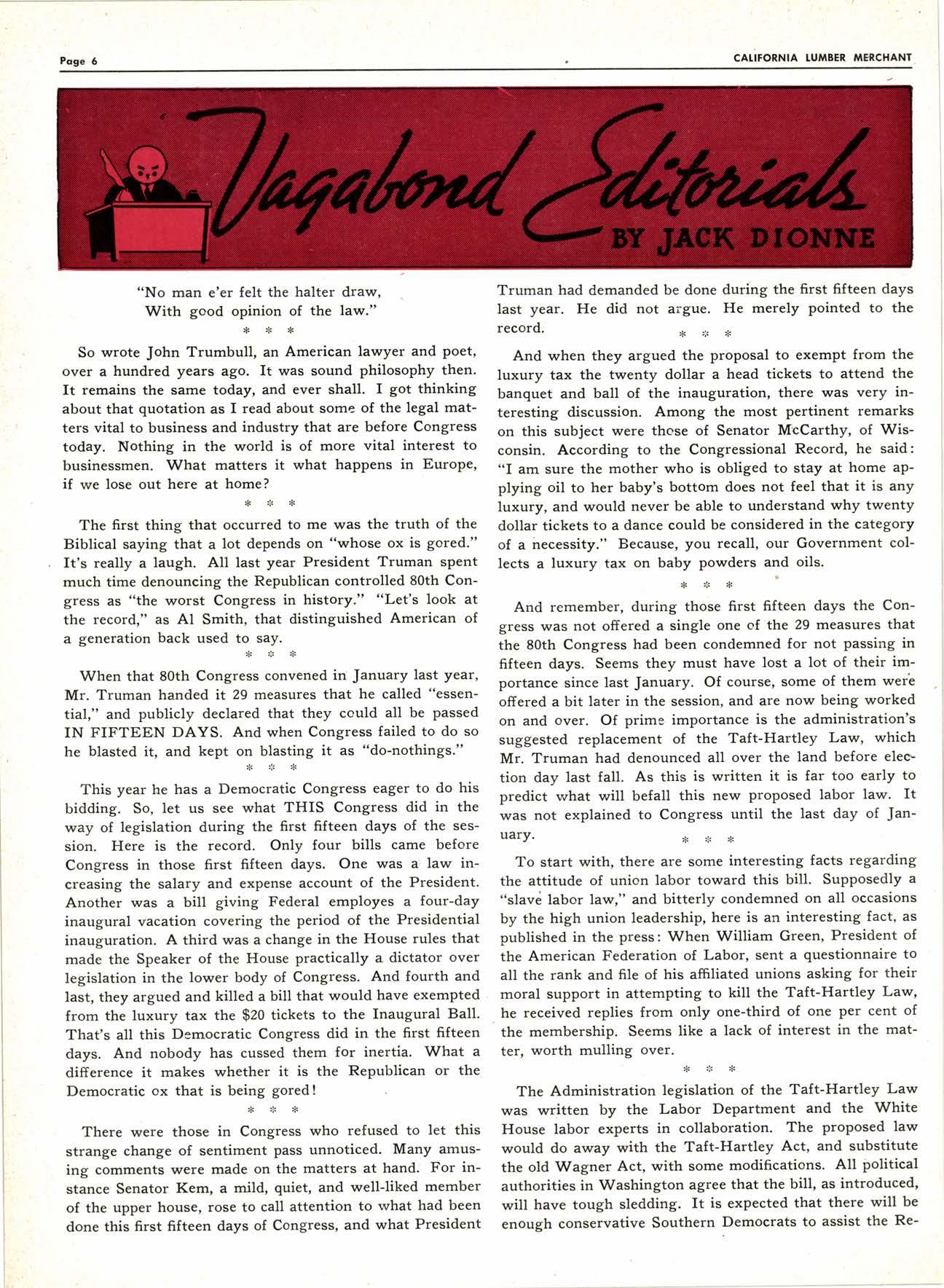
4 minute read
Tl|E I]t|]t|EDIATE AI|AI[ABII.ITY OT CATIFORI{IA PIl{E
ITEI.DITOOD (Arr PtNE THROUGHOUT)
Mode in our new plant qt Anderson, Cql.'
Ask any woodworker what type of plywood is easiest to work-the most satisfactory to paint or lnamelland you,ll get only one answer: california Pine. For years high quality-california pin-e has been extremely scarce. But now y" 1."." completed a model pine prywood pranr ai . Anderson, califor-nia, backed by over a bilion reet of ..Iioice timLer, and can offer this preferred type of plywood for prompt delivery.
. I|EWEST PnollucTloll tETllolts ultEouAlt Ett FoR pAlilTtile 0n EilltEllile This modern plaot utilizes impottalt Nootherlowcostpanelcompareswith newtechoiques designed to ptoduce the Catifornia pine for'satisfactory painting . highest quality at lowest possible cost. or enameling. There is no grain rise or For example, all veneers are dried from the i n sidi thus affotding "r;
Ji"",r::,::'1" Irt'rt J?:; of noisture and rosin content The pianels are precision-made, "ri"t " ;; reasoos for its widespread popularity. formaldehydehot-plategluingprocess.
SHtptEllTSAnEilgyrAnnlylllg
PlllE IHR0Ueil0UT Large shipments of California pine Califotnia Pine Veldwood is all pine. !?'eldwood are now arriving at our The use of all pine construction assures warehouses, Tbe demand however is abetterbehavedpanel-easiertowork gready in excdss ofour supply. To in-yith- edges which can be smoothly s're prompt deliveries we soggest that molded and dnished. you send us yoor orders now.
FEATUR,ES:
AIL PINE THTOUOHOUI UNEQUALIID FOR PAINTTNG OR TNAT;I,I}IG EASY Io FA8RIGATE BEAUTIFU1IY maDE-GAREFUITY SANDED rxcErrENr rot nouNflNo prAsflc rAttNArrs ton toultTtl{c ptAsItS [AilltAIES
CUPBIIAND D|'||R SIOCI( Yniff "fri31"#""*rhl,::t**f,ofls::3:I fne quality panel which can be painied readily.
SPECIFICAilONS OF SIZES AND THICKNESSES
?ANEISlZEt:
IHICKNESSES:
4.8'.'.x 96" }-ptyz \" *" h,, %"
48"x lO8" J-plyz y" y,. y,,
4E" x l2O" 7-?ly z y,' i,. 9-Plyz | 3/16"
GRADE9: tNtERton (riotsruRE_RESISTANI) oNry
SOUND I SIDE GOOD I SIDE SOTID I SIDE souND 2 STDES soUD 2 STDES
So wrote John Trumbull, an American lawyer and poet, over a hundred years ago. It was sound philosophy then. It remains the same today, and ever shall. I got thinking about that quotation as I read about some of the legal matters vital to business and industry that are before Congress today. Nothing in the world is of more vital interest to businessmen. What matters it what happens in Europe, if we lose out here at home?
The first thing that .""ir*lu ; -" was the truth of the Biblical saying that a lot depends on "whose ox is gored." It's really a laugh. All last year President Truman spent much time denouncing the Republican controlled 80th Congress as "the worst Congress in history." "Let's look at the record," as Al Smith, that distinguished American of a generation back used to t?. *
When that 80th Congress convened in January last year, Mr. Truman handed it 29 measures that he called "essential," and publicly declared that they could all be passed IN FIFTEEN DAYS. And when Congress failed to do so he blasted it, and kept on blasting it as "do-nothings."
This year he has a Democratic Congress eager to do his bidding. So, let us see what THIS Congress did in the way of legislation during the first fifteen days of the session. Here is the record. Only four bills came before Congress in those first fifteen days. One was a law increasing the salary and expense account of the President. Another was a bill giving Federal employes a four-day inaugural vacation covering the period of the Presidential inauguration. A third was a change in the Flouse rules that made the Speaker of the House practically a' dictator over legislation in the lower body of Congress. And fourth and last, they argued and killed a bill that would have exempted from the luxury tax the $20 tickets to the Inaugural Ball. That's all this Democratic Congress did in the first fifteen days. And nobody has cussed them for inertia. What a difierence it makes whether it is the Republican or the Democratic ox that is being gored !
There were those tr ;";.* who refused to let this strange change of sentiment pass unnoticed. Many amusing comments were made on the matters at hand. For instance Senator Kem, a mild, quiet, and well-liked member of the upper house, rose to call attention to rvhat had been done this first fifteen days of Congress, and what President
Truman had demanded be done during the first fifteen days last year. He did not argue. He merely pointed to the record. * >:. *
And when they argued the proposal to exempt from the luxury tax the twenty dollar a head tickets to attend the banquet and ball of the inauguration, there was very interesting discussion. Among the most pertinent remarks on this subject were those of Senator McCarthy, of Wisconsin. According to the Congressional Record, he said: "I am sure the mother who is obliged to stay at home applying oil to her baby's bottom does not feel that it is any luxury, and would never be able to understand why twenty dollar tickets to a dance could be considered in the category of a hecessitjr." Because, you recall, our Government collects a luxury tax on baby powders and oils.
And remember, during it"". lrst fifteen days the Congress was not offered a single one of tt.e 29 measures that the 80th Congress had been condemned for not passing in fifteen days. Seems they must have lost a lot of their importance since last January. Of course, some of them wer'e offered a bit later in the session, and are now being worked on and over. Of prime importance is the administration's suggested replacement of the Taft-Hartley Law, which Mr. Truman had denounced all over the land before elec' tion day last fall. As this is written it is far too early to predict what will befall this new proposed labor law. It was not explained to Congress until the last day of JanUafy. * {3 *
To start with, there are some interesting facts regarding the attitude of union labor toward this bill. Supposedly a "slavi labor law," and bitterly condemned on all occasions by the high union leadership, here is an interesting fact, as published in the press: When William Green, President of the American Federation of Labor, sent a questionnaire to all the rank and file of his affiliated unions asking for their moral support in attempting to kill the Taft-Hartley Law, he received replies from only one-third of one per cent of the membership. Seems like a lack of interest in the matter, worth mulling ot"..
The Administration legislation of the Taft-Hartley Law was written by the Labor Department and the White House labor experts in collaboration. The proposed law would do away with the Taft-Hartley Act, and substitute the old Wagner Act, with some modifications. All political authorities in Washington agree that the bill, as introduced, will have tough sledding. It is expected that there will be enough conservative Southern Democrats to assist the Re-

WORTHY OF ITS NAM E










